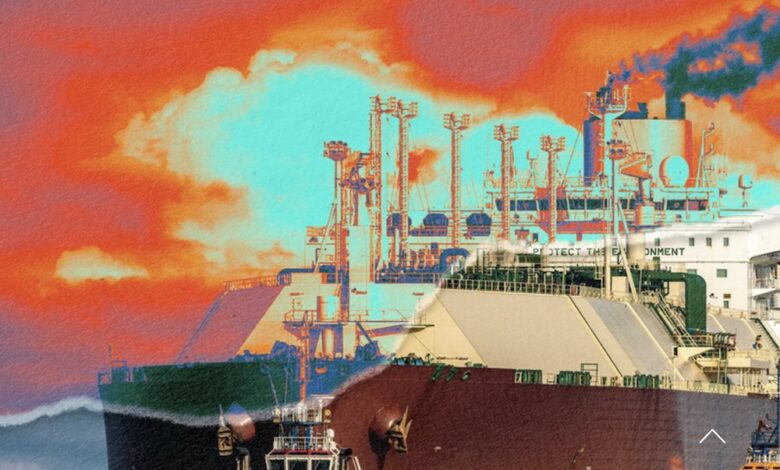
Elissama Menezes and Andrew Dumbrille, directors of Equal Routes, write for Splash ahead of this month’s crunch green vote at the International Maritime Organization.
In the face of the upcoming International Maritime Organization. (IMO) Net-Zero Framework vote next month, we’re seeing a lot of rhetoric around the so-called LNG pathway, yet little substance.
Recent commentary from IMO leadership and key industry players, including classification societies, has ignited a specious debate about the role of LNG as a “transition” fuel. Commercial interests from DNV and ABS – the latter running its own LNG Academy – are blatantly clear as they attempt to use their industry influence to sell LNG as a viable pathway.
But let us be clear with you, LNG, in any shape or form, cannot be a solution for shipping. The IMO must recognise this in the guidelines that still need to be negotiated over the coming months, and that will shape the framework before it enters into action in 2027.
The reason why is simple: methane.
The reality is that methane emissions from ships fuelled by LNG increased 180% between 2016 and 2023. Research repeatedly shows that methane – a potent greenhouse gas – is incompatible with the shipping sector’s decarbonisation goals. Regardless of the source of LNG (fossil, bio-LNG, e-LNG), methane still leaks through the entire lifecycle of this fuel – from extraction and processing to storage and use at sea. Industry continues to tout “innovative” technological solutions that will address methane slip with poor science underpinning these claims.
The 180% sharp rise in methane emissions from LNG-fuelled ships is a massive public health concern. Methane is globally linked to 1.04 to 1.23 million respiratory-related deaths annually among adults over 30 and a higher risk of various cardiovascular diseases. Physicians have been sounding the alarm, as the consequences of LNG expansion do not stay within the confines of the shipping sector. At the local level, LNG exposes frontline communities to harmful pollutants, contaminates water sources, and strains under-resourced healthcare systems.
False promises have propped up LNG all along
The cost advantage reinforced by the industry’s short-term cost optimisation strategies is expected to sustain the increase of LNG-fuelled ships unless governments step in with clear policies to counter this trend. Despite robust demand projections, the LNG market is grappling with structural challenges. It is reasonable to expect that not all newbuilding contracts will be completed, and instead, see the pivot away from LNG to electrification continue to take place. Shipowners will inevitably confront either costly retrofits, with the latest available research estimating £113bn ($152m) to £185bn in losses investing in an LNG-capable fleet, or the early recycling of LNG-powered vessels – both carrying significant financial and environmental burdens. What may seem like a short-term economic strategy risks leaving the sector with a costly legacy of prematurely obsolete ships.
The path is clear: there is no space in the IMO Net-Zero Framework for LNG. What we need instead has been clearly articulated by the Marshall Islands, Mexico, Palau, Solomon Islands, Tuvalu, and Vanuatu, and the civil society at the IMO.
First, the IMO must align shipping’s climate ambition with the 1.5 degree climate-warming pathway and the principles of a just and equitable transition.
Secondly, governments must ensure alignment and coherence among all three policy elements that are critical to make the IMO strategy work: a carbon intensity measure, a global fuel standard, and a GHG pricing system. These must be guided by life cycle assessment (LCA) guidelines based on the well-to-wake principle.
Finally, the correspondence group on ‘other social and economic sustainability aspects of marine fuels’ within the LCA guidelines must be re-established to send a strong signal that the IMO is serious about applying the well-to-wake principle across its GHG framework.
Special attention must also be paid to the land rights of Indigenous and rural communities, as well as the risks to biodiversity, water, and food security that come with land-use change. Embedding these human rights and ecosystem perspectives in the LCA guidelines would ensure that assessments of new marine fuels put people and nature at the centre.
Once the IMO applies this comprehensive life-cycle approach under the framework’s guidelines, it becomes clear that methane-based fuels – LNG, biomethane, and e-methane – cannot credibly deliver on climate, pollution, or human rights objectives, exposing the industry’s rhetoric for what it is: false promises that have propped up LNG all along.
- Finnish court drops Baltic subsea cable case against Eagle S crew
- DP World partners with PayPal to speed up cross-border trade
- 中国电气装备成功研制满足行业新标准的特高频局放在线监测系统
- Ichnusa Wind Power获准在撒丁岛海岸探索浮动海上风电场址
- 德国Voltfang与Palladio达成2.5亿欧元电池储能合作
- The great LNG scam: the IMO’s climate credibility is on the line
- 液化天然气大骗局:国际海事组织的气候信誉岌岌可危
- 芬兰法院撤销针对Eagle S船员的波罗的海海底电缆案件
- DP World与PayPal合作加快跨境贸易
- 瓦锡兰与Managem子公司Boto签署塞内加尔金矿发电厂运维协议




